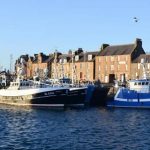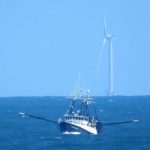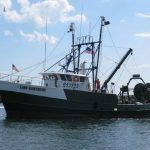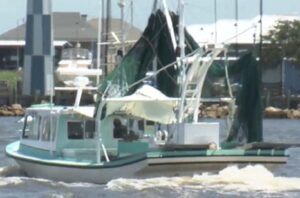Category Archives: Featured

Back to the pricing board: Panel to hear submissions on NL snow crab pricing while union requests slight delay to season starting
After a busy week away from the negotiating table, the focus of the Newfoundland and Labrador snow crab season will shift to a hearing before the province’s Standing Fish Price Setting Panel on Saturday, March 29. Despite hopes to avoid having to resort to the panel to determine the minimum price for crab again this season, the union representing the province’s inshore fish harvesters and plant workers and the organization representing fish processing companies were unable to reach enough common ground for a new collective agreement. That means both sides will present their respective submissions to the panel, which will decide who has the most reasonable offer for pricing crab landings this coming season. more, >>CLICK TO READ<< 15:41

Louisiana Shrimpers Are Fighting To Preserve A Historic Gulf Industry
It’s hard to nail down Dino Pertuit. I finally catch the Louisiana seafood legend early in the morning, and we chat while he drives back from a shrimping expedition, the phone call dropping at least three times along the way. His rich Cajun accent and the rumblings of his truck in the background make it hard for me to decipher everything he’s saying. But one sentence stands out crystal clear: “I’m going to do it until I die,” he says of shrimping. And at 57 years old, he’s one of the younger ones who keep it going. A third-generation shrimper, Pertuit has watched as prices for his Gulf catch have stagnated, but the hard work of harvesting it has stayed the same. He says his shrimp commanded about $3.50 a pound in the 1980s and today they still hover around that price—while the costs for everything else, like fuel and boat insurance, have only gone up. His product remains highly coveted; he supplies shrimp to many of New Orleans’ top restaurants, including Herbsaint and Cochon. Photos, more, >>CLICK TO READ<< 06:29

St. Bernard couple’s shrimp boat takes them on a 5-month, 6,000-mile journey around Great Loop
If this were a romantic comedy, it would be called “Tracy and Stacie’s Big Adventure.” If it were a seafaring adventure novel, the title could be “Around the Loop in 125 Days.” Whatever you call it, the five-month nautical journey that St. Bernard residents Tracy and Stacie Alfonso recently completed was the trip of a lifetime. Now the couple is home and their shrimp boat docked once again at Delacroix Island after completing the 6,000-mile Great Loop. Tracy Alfonso, who grew up in a commercial fishing family and shrimped all of his life, had dreamed of navigating the Great Loop since he heard about it. Called the greatest boat adventure in North America, the journey entails circumnavigating much of the United States and parts of Canada. Photos, more, >>CLICK TO READ<< 13:03

Carney acknowledges protesting N.L. fish harvesters during 1st campaign stop
Liberal Leader Mark Carney kicked off his election campaign in St. John’s on Sunday, promising tax cuts and also addressing the hundreds of protesting fish harvesters outside the city’s convention centre. Protesters continued to block the lobby, despite securing a meeting with Fisheries Minister Joanne Thompson and a promise to look at restructuring the Department of Fisheries and Oceans. A heavy police and security presence remained at the centre on Sunday evening, as police guided Liberal attendees through alternative exits. During his speech, Carney acknowledged the protesting harvesters, and said he is there to listen. He said his government will take a closer look at the department of Fisheries and Oceans, with the goal of creating a sustainable fishery and potentially restructuring the department. Videos, photos, more, >>CLICK TO READ<< 06:31
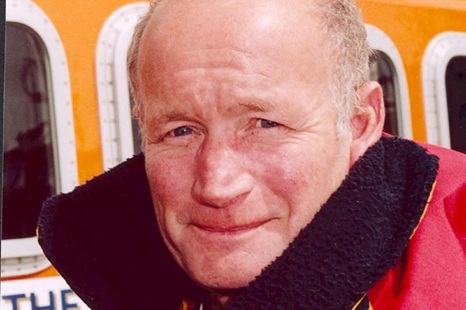
Tributes to heroic Northumberland fisherman who saved 127 lives at sea and was honoured by Queen
Tributes have been paid to a Northumberland RNLI member who was directly involved in saving more than 120 lives at sea. Rodney Burge, born and bred in Amble, started off his maritime career very early and actually lied about his age to get into the Royal Navy at 15. Mr. Burge left the Royal Navy in 1969 and returned to his hometown, where he signed up for the volunteer lifeboat crew alongside his day job as a fisherman. In 1992 he was appointed Coxswain and served until his retirement at the age of 55 in 1999. Queen Elizabeth II presented Mr Burge with an MBE for service to safety at sea in 1998, and in 2023, he was given a vellum by the RNLI at Amble. It was said that he was directly responsible for saving 127 lives at sea over his time with the charity. Photos, more, >>CLICK TO READ<< 13:35
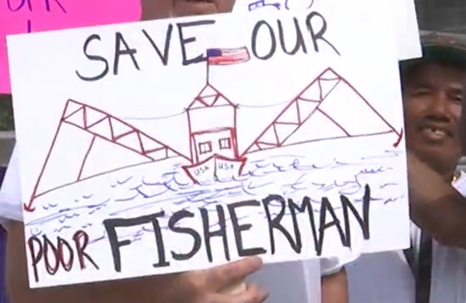
Save Our Shrimpers Act reintroduced to prevent taxpayer dollars from being used to fund foreign shrimp
Recent findings by the Southern Shrimp Alliance uncovered that United States taxpayer dollars were being used to finance foreign shrimp operations through international financial institutions. Cheri Blanchard is a Louisiana board member with the Southern Shrimp Alliance. “We find these situations like we’ve been ringing the bell about the World Bank and about international financing going into foreign shrimp aquaculture and with taxpayer money,” said Blanchard. “The value of U.S. Shrimp has been cut in half from 2021 to 2023, and it’s still about that value because people have had to tie up their boats,” she said. Video, more, >>CLICK TO READ<< 06:08
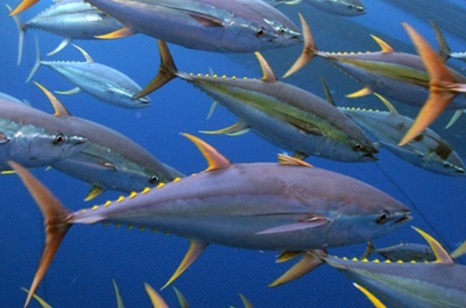
Rep from American Samoa calls for opening protected Pacific waters to tuna fishing
U.S. Congresswoman Amata Radewagen, who represents American Samoa, has urged the Trump administration to reopen most of an enormous marine protected area in the Central Pacific Ocean to industrial fishing while also recommending the reopening of other Pacific MPAs. In a Jan. 23 letter to President Donald Trump, Radewagen called for his administration to open the vast majority of the Pacific Islands Heritage Marine National Monument (PIH) to commercial tuna fishing. PIH, which is larger than the U.S. state of Texas, is an area of exceptional biodiversity. Radewagen’s letter called reopening it an “immediate need” that would benefit the country’s economy and challenge “Chinese fishing dominance.” She also sent Trump a background document that, among other requests, called for an executive order to open all Pacific marine national monuments and national marine sanctuaries to tuna fishing and to withdraw the U.S. from efforts to develop large marine protected areas in international waters. Map, photos, more, >>CLICK TO READ<< 14:40
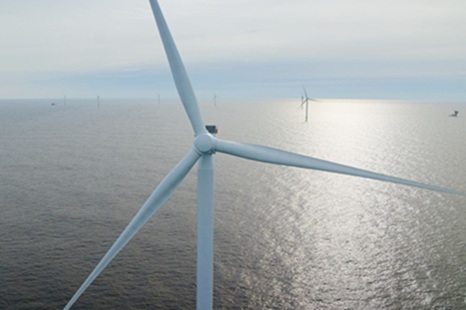
EPA Halts Atlantic Shores Wind Farm Construction as Trump Administration Reviews Projects
The Environmental Protection Agency (EPA) has suspended permits for the Atlantic Shores Offshore Wind Project off New Jersey’s coast following a January 2025 Presidential directive that ordered an immediate halt to offshore wind development. The Environmental Appeals Board (EAB) granted EPA Region 2’s request to remand permits for the project, which had previously received approval to construct up to 200 wind turbines capable of generating 2,800 megawatts of power – enough electricity to power one million homes. The suspension comes amid broader industry challenges, including Shell’s recent withdrawal from the project with a $996 million impairment and the cancellation of New Jersey’s fourth offshore wind solicitation. more, >>CLICK TO READ<< 08:38
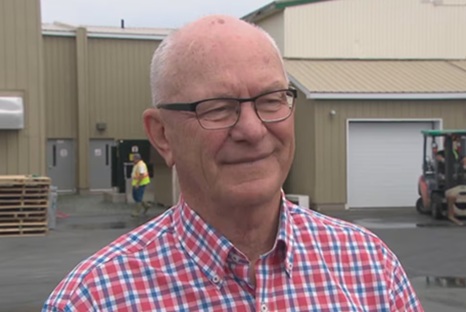
Canadian crab, lobster industry officials look for answers in Boston
Canadian crab and lobster industry representatives, including some from New Brunswick, will be looking for answers and opportunities at a seafood exhibition in Boston. The goal is to develop relations with other industry players as Canada faces tariff troubles with both the U.S. and China. The expo attracts many countries. Major seafood exporters set up booths at the show. “It’s going to be very difficult to settle on prices given that we have to build in that the tariffs are happening,” said Geoff Irvine, executive director of the Lobster Council of Canada. The expo attracts many countries. Major seafood exporters set up booths at the show. “I’ll be looking to see what they do, how they do it, how they pay for it, and try to bring that home, and once again attempt to come up with a marketing strategy for all Canadian seafood,” said Irvine. Photos, more, >>CLICK TO READ<< 09:05

How the Alabama Seafood Labeling Law is affecting Gulf Coast industry
Almost a year after being signed into law, residents should be beginning to see impacts the Alabama Seafood Labeling Law is having on the local industry. The Seafood Labeling Law was signed into law in May 2024, requiring in-state food establishments, such as grocery stores, restaurants, food trucks and in-store delis, to disclose and label whether any seafood being served was imported or domestically produced, as well as whether the seafood was farm-raised or wild-caught. Sellers are encouraged, but not required, to disclose the country of origin of imported foreign fish or shellfish. It also requires seafood suppliers who sell to these establishments within the state to disclose the country of origin so the retailers can accurately inform customers. It does not apply to ingredients in processed food. more, >>CLICK TO READ<< 07:47
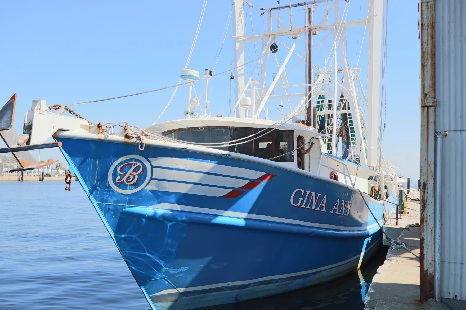
Amid ‘shrimp fraud’ reports, Tampa Bay area shrimpers need support
When restaurants charge a premium for Gulf-caught shrimp and pocket the extra profit by serving farm-raised imported shrimp, they’re denying local shrimpers a fair income. A recent study by SeaD Consulting revealed that 42 out of 44 Tampa Bay area restaurants surveyed were falsely passing off imported shrimp as locally caught. Local shrimpers say the effects of this kind of shrimp fraud go beyond betrayed diners. Shrimper Merritt Joseph Latino has been in the business for over 17 years. On one arm, underneath an anchor tattoo, the words “shrimpin’ ain’t easy” are permanently emblazoned in ink. Photos, more, >>CLICK TO READ<< 07:38

F/V Elite Navigator carried more safety equipment than required, writes TSB in investigation report
It’s impossible to know what caused the fire on the Elite Navigator in July 2024, as the fishing vessel was never recovered. But nearly seven months later, the Transportation Safety Board of Canada’s (TSB) investigation reveals what happened in the vessel’s final moments. According to the TSB report released on Wednesday, light smoke was visible in the engine room soon after a smoke alarm sounded at 7:30 p.m. NT. “A crew member in the deckhouse yelled that there was a fire in the exhaust trunking.” The report says the crew of the Elite Navigator were highly skilled in distress communications, even carrying devices not required by regulation like satellite communication devices and cell phones. more, >>CLICK TO READ<< 16:22

West Coast fishery managers troubled by NOAA layoffs as another 1,000 employees expected to be let go
The long-term impacts of staff cuts at the National Oceanic and Atmospheric Administration are still unknown, but fishery managers on the West Coast say the situation is troubling. On Feb. 27, NOAA laid off more than 800 workers as the Trump administration continues its push to reduce the federal workforce. On Saturday, the New York Times reported that the nation’s premier agency for weather and climate science has been told by the Trump administration to prepare to lose another 1,000 workers. more, >>CLICK TO READ<< 09:49

Low salmon numbers in California could prompt shutdown of fishing for a record third straight year
California’s salmon population has declined so severely over the last several years that regulators canceled the fishing season in 2023 and again in 2024. This year, state estimates show the number of Chinook salmon is still so low that fishing could again be prohibited — or if not, sharply limited — to help fish stocks recover. “A lot of the guys right now are basically doing land jobs because the fishery has just been devastated,” said George Jue, a commercial fisherman at Pillar Point Harbor in Half Moon Bay. Even as many fishing boats have sat idle in the harbor lately, Jue and a group of other fishermen have been busy hauling in traps filled with crabs. Once that season is over, Jue said, he expects little or no salmon fishing this year. “This harbor is going to be dead.” more, >>CLICK TO READ<< 08:50
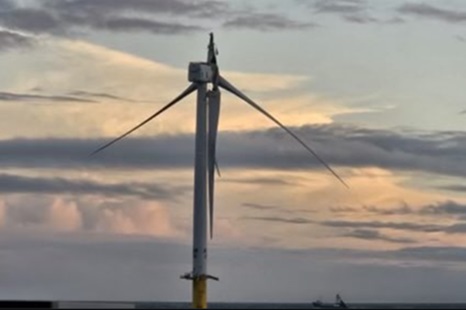
Damaged Wind Turbine that Polluted Nantucket Beaches Last Year Further Damaged in Lightning Strike
Lightning struck a wind turbine off the coast of Nantucket, Massachusetts, last week, further damaging a turbine operated by Vineyard Wind that made headlines last year when its blade fell off, polluting the ocean and nearby beaches. “The coverup blows on. Vineyard Wind’s lack of transparency around the structural integrity of its mammoth wind turbines is deeply frustrating to fishermen,” said Jerry Leeman, CEO of the New England Fishermen’s Stewardship Association. “In fact, Vineyard Wind officials met in February with officials from the Bureau of Safety and Environment Enforcement to discuss improving communications over safety issues. Foreign offshore wind developers seem breezily dismissive of commercial fishermen,” he added. Photos, more, >>CLICK TO READ<< 07:15

Offshore wind will not be allowed on Georges Bank – New moratorium is a response to calls from the fishing industry
Ottawa and Nova Scotia say they will not allow offshore wind developers to place turbines on Georges Bank, a lucrative fishing ground that is already protected from offshore petroleum development. Nova Scotia Energy Minister Trevor Boudreau says Georges Bank will be protected with a 10-year moratorium that can be renewed at the end of the term if supported by both governments. “It’s a very lucrative fishing bank, has an incredible resource there that we’re utilizing to its full potential, and this is about saying: that’s where we’re focused on, is that sector in that area,” Boudreau told reporters at Province House. Boudreau and Jonathan Wilkinson, the federal minister of energy and natural resources, announced Thursday that they have directed their joint offshore energy regulator to apply the moratorium. more, >>CLICK TO READ<< 18:29

A Watchdog Group Told People to Not Buy Maine Lobster. Now It’s Facing a Lawsuit.
A lawsuit related to Maine’s lobster industry is no longer stuck in the claws of the legal system. A federal judge recently ruled that the Maine Lobstermen’s Association and others can proceed with their defamation suit against the nonprofit Seafood Watch, The New York Times reported on Monday. The lobstermen’s group initially sued the nonprofit, which is run by the Monterey Bay Aquarium, almost two years ago, following Seafood Watch’s downgrading of Maine lobster from yellow to red in its sustainability ratings. “This ruling is a crucial step in holding the Monterey Bay Aquarium accountable for misleading statements that have unfairly targeted our industry,” Patrice McCarron, the executive director of the Maine Lobstermen’s Association, said in a statement. more, >>CLICK TO READ<< 11:49

Rhode Island’s ‘Squid Squad’ targeted in DOGE purge of NOAA
The head of squid research at the National Oceanic and Atmospheric Administration’s (NOAA) Narragansett Bay facility is among the hundreds of agency employees nationwide who are no longer on the job, according to one of NOAA’s former administrators. Former National Marine Fisheries Service Administrator Janet Coit said Monday that about 20 employees from NOAA’s Rhode Island office and the Woods Hole Oceanographic Institute in Massachusetts were recently dismissed by Elon Musk’s Department of Government Efficiency (DOGE). Coit shared the revelation during a roundtable discussion hosted by U.S. Rep. Seth Magaziner (D-R.I.) at Save the Bay’s headquarters near the Port of Providence. more, >>CLICK TO READ<< 06:56

Guest writers: Bellingham’s SE Alaska salmon fleet threatened by lawsuits, misinformation
We appreciated Ed Johnston’s opinion editorial on Feb. 19, calling for cooperation in how we manage our salmon fisheries under the Pacific Salmon Treaty. As Washingtonians and Alaskans, we know that our shared Pacific salmon fisheries must be managed in a manner that considers how interceptions of salmon bound for distant watersheds may impact ecosystems, salmon populations and communities coastwide. That is why Washington sits alongside Alaska — as well as Canada — at the negotiating table under the Pacific Salmon Treaty. In order for our salmon and people to thrive, interceptions of salmon between the two countries must be managed using sound science and a cooperative approach. Our commitment to cooperative management and working collaboratively under the Pacific Salmon Treaty is as strong as our commitment to sustainable fishing livelihoods. more, >>CLICK TO READ<< 08:24

Once a form of currency, quahogs remain a steady source of cash
Quahogs have long been associated with money and wealth. “Quahog” comes from an Algonquian word for hard clam, but its scientific name is Mercenaria mercenaria, from the Latin for wages. In response to the scarcity of soft-shell clams, local harvesters have shifted their efforts to quahogs. From 2011-2015, the quahog harvest in Harpswell ranged from about 5,000 to 60,000 pounds. By 2023, the quahog harvest in Harpswell had skyrocketed to 458,000 pounds. In that period, the value of quahog landings also grew, from about $80,000 in 2015 to nearly $900,000. By contrast, the value of Harpswell’s soft-shell landings in 2023 was $384,000. Clearly, for Harpswell’s diggers, quahogs are now where the money is. Photos, more, >>CLICK TO READ<< 16:40

A long time coming; Fish plant in Arnold’s Cove processes the first NL-caught northern cod since 1992 moratorium
There was no shortage of excitement at the fish plant in Arnold’s Cove on Thursday, Feb. 27, 2025, as the Icewater Seafoods processed its first offshore northern cod caught by Newfoundland and Labrador’s fleet since 1992. That was the year the commercial offshore fishery for northern cod came to a grinding halt under the moratorium imposed by the federal Department of Fisheries and Oceans (DFO). On Thursday, Capt. Peter Melvin and his 29-person crew from the Katsheshuk II, one of Ocean Choice International’s two offshore groundfish vessels, landed offshore Northern cod for the first time at the Icewater Seafoods plant. The crew was proud to be the first and we were encouraged by what we saw. The catch rates were good, we had clean catch with little to no bycatch and the fish were healthy. Photos, more, >>CLICK TO READ<< 16:45

Imposter captain steals Westport fishing boat with crew onboard
An imposter stole a fishing vessel — with the crew still on board — from a dock in Westport, according to the Washington Department of Fish and Wildlife (WDFW) Police. WDFW Sergeant Alexander was reportedly patrolling in Westport when he “heard a radio call for a vehicle theft in progress; not the usual car or motorcycle theft, but an eight-million-dollar, 80-foot commercial fishing vessel, the Jamie Marie.” According to police, the imposter had boarded the boat, awoken the crew, and informed them that they needed to get underway. The newer crew who didn’t know the captain didn’t argue, thinking he was perhaps an alternate operator or sent by the real captain. more, >>CLICK TO READ<< 15:09

Top Alaska House legislators reject plan to allow fish farms
Two leading members of the Alaska House of Representatives on Monday announced their opposition to a proposal from Gov. Mike Dunleavy to lift the state’s 35-year-old ban on fish farms. In a written statement, Speaker of the House Bryce Edgmon, I-Dillingham, and House Rules Committee Chair Louise Stutes, R-Kodiak, said the bill will not aid the state’s commercial fishing industry. Stutes also chairs the House Fisheries Committee, and Edgmon is the committee’s vice chair; without their support, House Bill 111 is unlikely to advance. Dunleavy has proposed keeping a ban on salmon farming but is seeking permission for farming other types of fish. Alaska has banned all types of fish farming for decades under the belief that allowing farming poses social and environmental risks to the state’s wild fish. more, >>CLICK TO READ<< 11:11

The American lobster’s baby bust
The Gulf of Maine is home to one of the most valuable fisheries in the United States. Every year, American lobsters (Homarus americanus) from the gulf fuel a multibillion-dollar industry, buoying fishing communities across New England and across the border into Atlantic Canada. The Gulf of Maine is also heating up faster than almost any other marine environment on Earth. In the gulf, rising water temperatures and shifting currents have already triggered shocking declines in other mainstay catches, such as northern shrimp, and put surprising new species in fish traps. Now, ongoing research led by Joshua Carloni, a marine biologist with the New Hampshire Fish and Game Department, shows a potentially dire situation brewing for the area’s most valuable species—the lobster. more, >>CLICK TO READ<< 08:36

Coastal Virginia Offshore Wind Pause
When your friends think you wrong and your opponents are saying nice things, a reevaluation of your position might be in order. Did it. It was still correct for the Thomas Jefferson Institute for Public Policy to put Virginia’s energy ratepayers first and express concern for the financial harm they might suffer if a wind turbine project gets cancelled. Dominion Energy Virginia’s offshore wind project, now with a $10.7 billion price tag (not including decades of profit), is about half complete. A call to pause and perhaps cancel it was issued by a consortium of wind energy opponents from multiple states. President Donald Trump’s Executive Order has called for a review of pending projects, but it apparently did not pause Dominion’s and three other projects already under construction. more, >>CLICK TO READ<< 09:25

NOAA set to slash jobs ‘imminently’
Mass firings are set to hit the National Oceanic and Atmospheric Administration (NOAA) “imminently,” a source with knowledge told The Hill. The person, who asked to speak anonymously due to fear of reprisals, said that the agency had not yet been subjected to the steep cuts announced elsewhere due to the then-pending confirmation of Commerce Secretary Howard Lutnick. The Commerce Department oversees NOAA and the National Weather Service. Many of the federal cuts thus far have targeted probationary workers, which includes recent hires but also those who have been recently promoted. more, >>CLICK TO READ<< 12:34






































